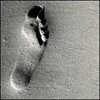Symbols of Power
Nouvel
When Napoleon I first came to power in 1799 as First Consul of France, he modeled his new regime on the Roman Republic. When he was declared Emperor in 1804, the model changed from the Roman Republic to the Roman Empire. As part of this new government, Napoleon sponsored a program of arts that reflected his view of France as the New Rome. No ruler in the history of the world has been more aware of the capacity of symbolism to propagate power. But, despite his titanic military and political prowess, his most long-lasting and influential achievement was in the decorative arts. To glorify his regime, he encouraged French furniture-makers, silversmiths, jewelers and porcelain and textile manufacturers to produce gorgeous objects decorated with a wealth of antique motifs such as columns, arches, laurel wreathes, acanthus leaves, eagles and Egyptian hieroglyphs. Furniture, vases, porcelains and even silverware were produced in antique styles intended to project an aura of imperial majesty, featuring a rare combination of austere forms and opulent materials. This is the manner that came to be known as the Empire Style. This is a remarkable book, which accompanies a traveling exhibition organized by the Musee des Art Decoratifs in Paris, and is comprehensive compendium of the Empire Style in all its glory. Lavishly illustrated with superb photographs, many taken expressly for this book, it will be a landmark in the library of the history of the decorative arts and an essential reference for lovers of wonderful objects everywhere.
więcej
Informacje dodatkowe o Symbols of Power:
Wydawnictwo: angielskie
Data wydania: b.d
Kategoria: Socjologia, filozofia
ISBN:
Liczba stron: 0
Kup książkę Symbols of Power
Sprawdzam ceny dla ciebie ...
Cytaty z książki
REKLAMA



















Chcę przeczytać,